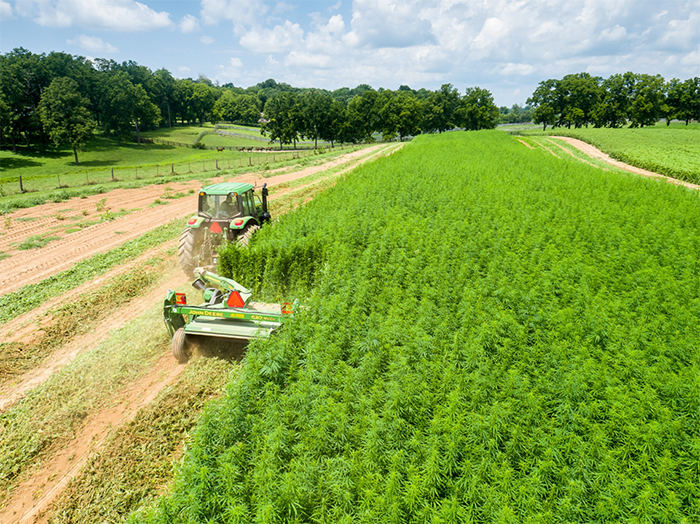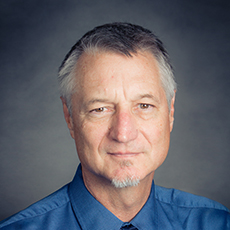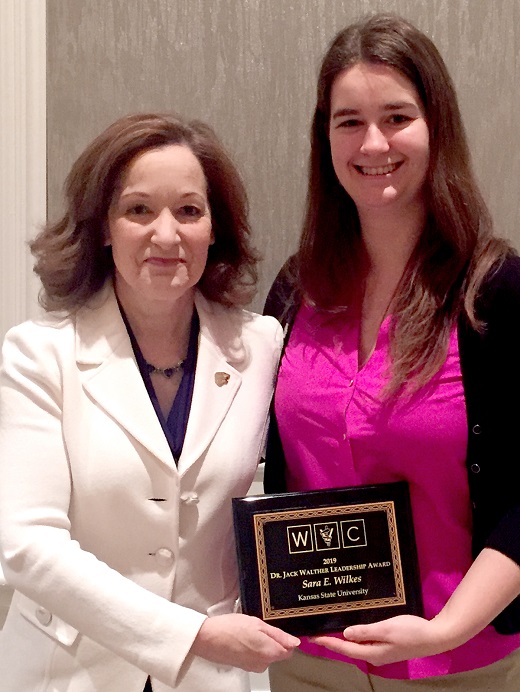03/06/19
K-State Current - March 6, 2019
K-State Current is a weekly news update for the Kansas Board of Regents to apprise the Regents on a few of the many successes and achievements made by K-State faculty, staff and students.

K-State News
K-State researchers prepare for first year of industrial hemp test crops

K-State Research and Extension specialists will begin growing and harvesting small, highly controlled plots of industrial hemp at research facilities around the state this year, much like the plot in this file photo from the University of Kentucky. Photo credit: Matt Barton, University of Kentucky Ag Communications
At two extremes, some hope industrial hemp can be the next big thing for Kansas farmers while others are convinced it’s fool’s gold.
Somewhere in between are Kansas State University researchers who will be looking for facts that can better inform everyone’s opinions.
In Kansas, Jason Griffin, director of the John C. Pair Horticulture Center in Haysville, leads the way in building expertise on the crop.
Industrial hemp is closely controlled by federal and state regulations because it comes from the same cannabis species as marijuana. But instead of getting people high, it is grown for fiber, seed or oil – each of which leads to a variety of end products.
Last April, the Kansas legislature’s Alternative Crop Research Act was signed into law by then-Gov. Jeff Colyer, allowing the Kansas Department of Agriculture to oversee research into the cultivation of industrial hemp.
Also last year, when the Pair Center faced the possibility of closure due to budget concerns, one of the primary options to shift part of the center’s focus was to consider industrial hemp research. Interim Dean of the College of Agriculture and Interim Director of K-State Research and Extension Ernie Minton made it clear from the beginning that he wants K-State to lead in this area of research because of its potential value to the agricultural marketplace.
Understanding hemp uses
Several questions loom large over this burgeoning industry, including whether hemp is an agronomic or specialty crop. Griffin says it’s both, depending on where it’s grown.
Industrial hemp is different from marijuana plants that are used for their intoxicating chemical tetrahydrocannabinol (THC). Industrial hemp contains little THC at all. Hemp can be used in the manufacture of a wide array of products such as paper, clothing, industrial textiles, insulation, body-care products and much more.
Currently, a high-profile use of hemp is for cannabidiol or CBD oil, which is touted as a possible treatment option for a number of health issues. Most of those claims, however, are unsubstantiated because it has been illegal to conduct research until recently.
The 2018 Farm Bill loosens regulations on industrial hemp research and production, removing it from the Controlled Substances Act, thus moving regulation and enforcement from the Drug Enforcement Agency to the U.S. Department of Agriculture. Still, to be legal, hemp plants must contain less than 0.3 percent THC content.
And any crop that grows incorrectly and ends up “hot” – with a THC level above the limit – must be completely destroyed.
Because the 2018 Farm Bill was signed into law in late December and was then followed by a partial government shutdown, KDA began 2019 working from the perspective of the 2014 Farm Bill but with an eye toward the changes in the new federal law – while also working to implement the new state law.
Fielding questions
Like Griffin, Northwest Area agronomist Lucas Haag and others at K-State, KDA has a task force focused on rapidly preparing to support farmers who want to pursue growing hemp. Primary among KDA’s responsibilities are ensuring regulations are closely followed to ensure hemp is grown, not marijuana.
Last week, KDA experts and Griffin hosted a webinar for K-State Research and Extension professionals who have already been fielding questions from curious agricultural producers across the state.
Providing such a service is not only necessary; it’s urgent because K-State Research and Extension agents are already getting calls about hemp. Currently, if someone brings a sample into an extension office, the staff is legally required to show them the door. Unless someone is approved to handle the plants, they can look but they can’t touch (see sidebar).
Questions about the growing process are numerous. Among them:
- Which of the many seed varieties grows well in different parts of Kansas and which don’t?
- How much water is needed?
- What business opportunities are there for growers? Should they grow for fiber? Seed? Oil?
- And where would they take their crops for processing?
- Where can they access certified seed?
- If a crop goes “hot,” would that be covered by crop insurance? Who would sell such crop insurance?
Griffin said K-State Research and Extension is at the earliest steps in trying to answer these questions. The University of Kentucky and Cornell University are the current research leaders in the United States, and they are getting ready to start only their fifth year of growing test plots.
K-State’s ag research will likely include test plots at the Pair Center near Wichita, the K-State Olathe Horticulture Research and Extension Center outside Kansas City, and the Northwest Research-Extension Center in Colby.
Growing concerns
“We’re growing for education, not to sell,” Griffin said, noting, “We have not grown any hemp yet.” He said K-State is looking at growing eight to 12 varieties in 8-by-20-foot plots, following Kentucky’s example.
He expects the unexpected, noting that varieties grown at Cornell in New York did not fare well in Kentucky or Ohio. And 10 percent of the test plots in North Carolina went hot and had to be destroyed.
“It scares me – the thought of some farmers investing tens of thousands of dollars … just to have to destroy their crop,” Griffin said.
The jury is still out regarding which growing methods will offer the best return on investment, he said: Crops grown for horticultural uses are more labor intensive – pruning and harvesting by hand – but have higher CBD content, while crops grown for agronomic uses have lower CBD content but also much lower labor costs because they can be grown in larger fields that a combine can run through.
One of the “rules of thumb” K-State scientists will test is “if you can grow good corn, you can grow good hemp.” Environmental stress will be a major factor in that assessment, because stress can cause plants to go hot – and Kansas’ climate is more stressful than Kentucky’s or New York’s, Griffin noted.
Because so many things can go wrong, his advice for K-State Research and Extension agents to pass on in their home counties and districts is to “go into industrial hemp production with their eyes wide open. Just tell them right up front, if anybody is promising you that you’re going to get rich, walk away.”
Kansas State University to host national science communication conference in March

SciComm 2019, a national science communication conference, will come to Manhattan in March and offer opportunities to engage the public in science.
The conference will be March 22-24 at Kansas State University. SciComm 2019, which is co-hosted by the Kansas Science Communication Initiative and the University of Nebraska-Lincoln, is dedicated to understanding and promoting effective communication of science to diverse audiences, including students of all levels as well as the general public.
"This conference will be a great way for our K-State students, faculty and staff to build their science communication skills and make connections with people in the community and at other universities," said Peter Dorhout, the university’s vice president for research. "Our goal of becoming a Top 50 public research university depends on our abilities to effectively articulate what we do and why we do it as part of our land-grant mission. This conference will offer the chance to learn new strategies in a fun and collaborative environment."
The conference includes two keynote speakers: Danielle N. Lee, a 2015 TED Fellow and a Southern Illinois University scientist who studies animal behavior and behavioral ecology, and Kevin Folta, a professor of horticultural sciences at the University of Florida and host of the Talking Biotech Podcast.
The weekend conference has several key focus areas, including STEM learning, science communication research, science and media, disciplinary-based education research and broader impacts.
Other events will be offered in three tracks: media, informal education and outreach/communication for scientists and researchers. The conference will include pre-conference workshops, a film festival and lightning talks on Friday evening, a Community Science Festival at Sunset Zoo on Saturday afternoon, and an "Explain it like I'm 5!" Open Mic Night on Saturday as well as other events.
"I am really excited about SciComm 2019, because it will bring together scientists, K-12 teachers, zoo and museum educators, as well as media producers," said Michi Tobler, an associate professor of biology and one of the conference organizers. "I hope this conference will help these different groups to get to know each other better and join forces to spread enthusiasm for science and research."
The SciComm conference is coming to Kansas State University through a partnership with the University of Nebraska-Lincoln. The conference began at the University of Nebraska-Lincoln in 2015 and was held there in 2016 and 2018. The conference has become successful at attracting faculty, teachers and education-focused professionals nationwide.
"The University of Nebraska-Lincoln is excited to partner with KSCI to bring the 2019 SciComm conference to K-State," said Michael Herman, the director of the School of Biological Sciences at the University of Nebraska-Lincoln. "The partnership with K-State allows us to expand to a regional audience and allow for more collaboration among science communicators in the Midwest and across the country."
For more information, including travel and accommodations, visit k-state.edu/scicomm/conference2019. To register for the conference, visit k-state.edu/scicomm/conference2019/register.html
K-State Faculty Highlights
Condia named American Institute of Architects fellow
Robert Condia, professor of architecture in the College of Architecture, Planning & Design, or APDesign, was elevated to the College of Fellows of the American Institute of Architects, or AIA. He is recognized for being an educator whose innovative pedagogy of embodied experiences teaches design thinking through the craft of architecture by implanting curiosity, critical aptitudes, a creative drive and self-confidence within his students.
The College of Fellows awards members who have made significant contributions to the architectural profession. Condia will be honored at an investiture ceremony at the AIA Conference on Architecture 2019 in June in Las Vegas.
Condia, is an architect and design partner with Condia+Ornelas Architects in Manhattan. He teaches architecture as an art form with due considerations to neuroscience and architecture; the real; the ancient works of man; a building's terrestrial and celestial alignments; metaphysics and poetics of architectural design.
"I am humbled to be one of the two people in the state of Kansas to be elevated this year, the first ones since 2006," Condia said. "In over 35 years of teaching nothing is more important than cultivating young talent by lighting up their love for building architecture and launching them on a career path. I have been a champion of experiencing architecture through teaching design thinking, preparing our students for careers in the profession of architecture, and by engaging them to reflect and research the meaning of design. It is rewarding the number of former students who have sent congratulatory notes and shared with me their fine achievements since they have graduated."
The AIA fellowship program was developed to elevate those architects who have achieved a standard of excellence in the profession and made a significant contribution to architecture and society on a national level. Prospective candidates must have at least 10 years of AIA membership and demonstrated influence in at least one of the following categories:
- Promoted the aesthetic, scientific and practical efficiency of the profession.
- Advanced the science and art of planning and building by advancing the standards of architectural education, training or practice.
- Coordinated the building industry and the profession of architecture through leadership in the AIA or other related professional organizations.
- Advanced the living standards of people through an improved environment.
The stringent requirements result in only 3 percent of the institute's more than 91,000 members being recognized as fellows. Currently, there are 3,425 living fellows globally of which only five live in the state of Kansas, and three are in the College of Architecture, Planning & Design at Kansas State University.
Condia has been a studio critic for more than 35 years in both architecture and interior design. He is the 2017-2020 Regnier Distinguished Faculty Chair, and in 2017 he was named one of DesignIntelligence's Most Admired Educators and earned APDesign's Wayne McElwee Faculty Teaching Award. In 2015 he received AIA Kansas' Schirmer Award for service, and in 2008 he was awarded the Commerce Bank Distinguished Undergraduate Teaching Award. His publications range from monographs on the works of progressive architects to theoretical articles on the experience of space as well as a catalog of his own surrealist illustrations. Of particular attention are his recent works on neuroscience and architecture, the biological basis of aesthetic experience, and the craft of teaching architects to teach.
Condia earned his master's in architecture and building design at Columbia University 1983, and a Bachelor of Architecture at California Polytechnic State University, 1980.
Founded in 1857, the American Institute of Architects consistently works to create more valuable, healthy, secure, and sustainable buildings, neighborhoods, and communities. Through more than 200 international, state and local chapters, AIA advocates for public policies that promote economic vitality and public wellbeing. Members adhere to a code of ethics and conduct to ensure the highest professional standards. AIA provides members with tools and resources to assist them in their careers and business as well as engaging civic and government leaders and the public to find solutions to pressing issues facing our communities, institutions, nation and world.
K-State Student News
College of Veterinary Medicine student from Wichita receives veterinary leadership award
Sara Wilkes, a third-year student in the Kansas State University College of Veterinary Medicine, is one of 37 recipients of the Dr. Jack Walther Leadership Award, which recognizes veterinary student leaders and promotes lifelong professional service to the industry.
Wilkes, Wichita, received the honor at the Western Veterinary Conference, Feb. 17-20, in Las Vegas.
One student each is selected from all of the veterinary colleges in the U.S., Canada and Caribbean Islands on the basis of accomplishments, scholastic excellence and long-term leadership potential. Recipients receive a $1,000 award and complimentary registration, lodging, airfare and a $525 travel allowance to attend the 2019 conference.
"I am honored to be a recipient of the Jack Walther Leadership Award," Wilkes said. "I am deeply indebted to the wonderful mentors and instructors that I have had here at Kansas State University who have inspired me to go above and beyond the veterinary curriculum. Both meeting other students from veterinary schools around the country and experiencing the Western Veterinary Conference have been invaluable experiences as I consider my future beyond veterinary school. I am proud to be counted among those students and look forward to working with and getting to know many other incredible veterinarians over the course of my career."
K-State Sales Team wins University of Toledo Invitational Sales Competition
The Kansas State University Sales Team recently brought home the first-place team award and a pair of individual awards, from the University of Toledo Invitational Sales Competition.
Hosted by the University of Toledo Feb. 21-23 in Toledo, Ohio, the competition pitted the K-State sales team against teams from 36 of the top university sales programs in the country. Sales competitions allow students to test their selling skills against their peers from other top sales schools through role-playing scenarios.
The K-State sales team was made up of Kaitlyn Porter, junior in management, Manhattan, and Katie Horton, sophomore in professional strategic selling, Overland Park, with Dawn Deeter, director of the National Strategic Selling Institute, traveling with the team as head coach. In the individual competition, Porter took second place in the junior division, which combined with Horton's third-place finish in the freshman/sophomore division to give K-State the overall team win.
"We couldn't be prouder of Kaitlyn and Katie’s performances," Deeter said. "Having success in these competitions helps bring recognition to what we are doing at K-State to prepare students for successful and fulfilling careers in sales. They also provide a great opportunity for our students to network with their peers and interact with employers from around the country."
The K-State Sales Team is housed in the College of Business Administration's National Strategic Selling Institute, which has been named one of the top sales programs in the country for seven straight years by the Sales Education Foundation. Last fall, K-State became just the 19th university in the U.S. to offer a major in sales. Students can also earn a certificate in professional strategic selling, which is open to all majors at the university. The professional strategic selling program introduces students to the fundamentals of sales and through the innovative curriculum and sales labs allows students to develop the skills needed to be successful.